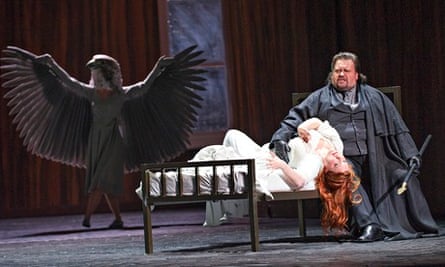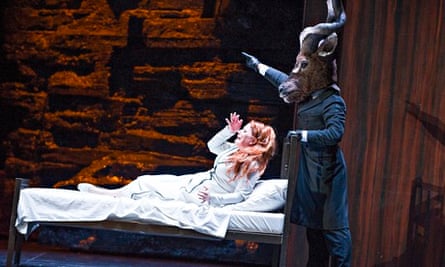
The Royal Opera is marking the 150th anniversary of Richard Strauss's birth with a new version of his most massive, most ambitious and, for some, most tendentious stage work. New, that is, to London: Claus Guth's production of Die Frau ohne Schatten is shared with La Scala, Milan, where it was first seen two years ago. It has been brought here with almost the same principals – of the five main singers, only the Barak, Johann Reuter, is new. That familiarity with the detail of the staging and with the hugely demanding score itself is a huge bonus; when matched with a conductor of Semyon Bychkov's Straussian pedigree in the pit, the result is a performance that is musically exceptional in every respect, whatever one thinks of the dramatic treatment.
In a work already overloaded with magic and allegory, Guth tilts and twists Hugo von Hoffmanstahl's libretto and adds extra psychological layers of his own. He makes it all – I think – a sexually charged dream in the mind of Emily Magee's Empress, who is seen at the beginning of the opera in bed in the timeless, mahogany-veneered surrounds of Christian Schmidt's basic set, fussed over by nurse, husband and doctor, and she is rarely off-stage after that.
As the opera goes on, a revolve at the back of the stage provides regular Magritte-like glimpses of other realities, but the visual contrast between the worlds of the two childless couples, the fairytale shimmer around the Emperor and the Empress, and the grungy drudgery of the life of Barak and his wife, is more or less abolished. Barak has changed his occupation, too. Instead of the dyer of the original, he's now a tanner, bloodily working away at a gazelle skin (heavily symbolic, of course) in a couple of scenes, and perhaps more in keeping with the sombre, monochrome look of the design. Video projections – a hovering kestrel, a hand caressing the flank of a deer, a shoal of fish – supply some of the detail absent elsewhere. The action is also haunted by three animal-headed figures (gazelle, falcon, and a rather sinister, heavily horned ram, who is perhaps the Spirit King Keikobad, the Empress's father), while the unborn children who materialise in the final scene have young gazelle's heads, too.
The programme includes the director's own glossary of all this symbolism, but it also uses Hoffmanstahl's original synopsis, which is less helpful. The score is cut even more than it usually is in the theatre, and in the third act especially, the description of the action includes passages that have been omitted; a work whose convolutions are never that easy to follow is unnecessarily made more so. There is always, though, the gorgeously sumptuous score to rely on, and whether transcendently lyrical or fiercely confrontational, Bychkov and the Royal Opera House Orchestra never fail it, even though from where I was sitting the necessity of placing some of the percussion in the stalls circle turns a few passages into concertos for castanets.

The cast doesn't disappoint either, with even the smaller roles, such as Ashley Holland's dragon-winged Spirit Messenger, taken with real distinction. Magee is a warm, often radiant Empress, perhaps less vulnerable than she might be at times, but more than a match for Johan Botha's statuesque, sturdily sung Emperor. Elena Pankratova is Barak's Wife, less shrewish, more coquettish than some, just as Reuter makes Barak himself, a less boorish figure than he can be; their duet at the beginning of the third act is rapturously done, and Michaela Schuster's Nurse is a class act, too, wonderfully mingling malevolence and allure. For singing and playing like this, you can forgive the production a great deal.
The performance on 29 March will be broadcast on Radio 3.
Comments (…)
Sign in or create your Guardian account to join the discussion